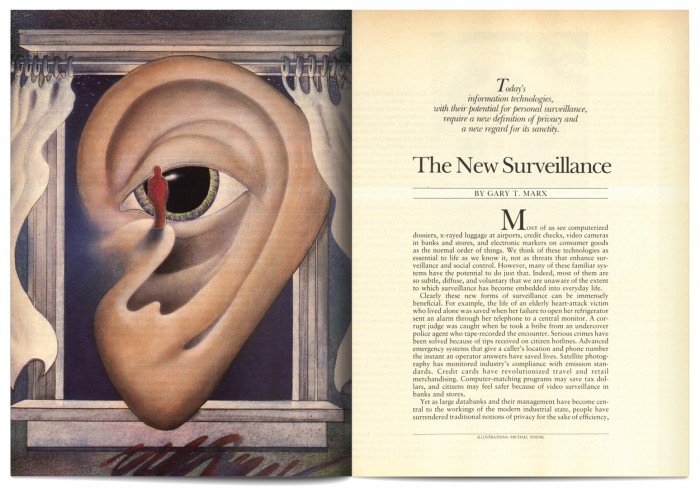Selling Privacy Short
Excerpted from “The New Surveillance,” by Gary T. Marx, originally published in the May 1985 issue of Technology Review.

Modern surveillance technologies now allow organizations to monitor people’s movements to a degree previously imagined only in fiction. Aircraft that can spot a car or person 30,000 feet below have been used to monitor drug traffickers. Satellites may soon be used for this purpose as well. The CIA has apparently used satellite photographs to monitor antiwar demonstrations and civil disorders. Computer enhanced satellite photography can identify vehicles moving in the dark. One-way video and film surveillance has expanded rapidly, as anyone who ventures into a shopping mall or uses an electronic bank teller should realize.
Other devices now in use include sensitive miniature but powerful radio transmitters; tape recorders the size of a match box; video cameras the size of a deck of cards; instruments for detecting motion, air currents, vibrations, odor, and pressure changes; and voice-stress analyzers.
The National Security Agency can simultaneously monitor 54,000 telephone transmissions to and from the United States. The agency operates beyond the usual judicial and legislative controls, and can apparently disseminate its information to other government agencies at will.
Citizens’ ability to evade all this surveillance is diminishing.
To venture into a shopping mall, bank, or subway, sometimes even into a bathroom, is to perform before an unknown audience.
To avoid such intrusions, people may decline needed services such as mental-health care, and avoid controversial actions such as filing grievances against governments. We may shun risks and experiments as the new technology exerts subtle pressure for conformity at the expense of diversity, innovation, and vitality.
In a society where everyone feels as if he or she is a target for investigation, trust—the most sacred element of the social bond—is damaged. Indeed, today’s surveillance technologies may be creating a climate of suspicion from which there is no escape.
Keep Reading
Most Popular
Large language models can do jaw-dropping things. But nobody knows exactly why.
And that's a problem. Figuring it out is one of the biggest scientific puzzles of our time and a crucial step towards controlling more powerful future models.
The problem with plug-in hybrids? Their drivers.
Plug-in hybrids are often sold as a transition to EVs, but new data from Europe shows we’re still underestimating the emissions they produce.
Google DeepMind’s new generative model makes Super Mario–like games from scratch
Genie learns how to control games by watching hours and hours of video. It could help train next-gen robots too.
How scientists traced a mysterious covid case back to six toilets
When wastewater surveillance turns into a hunt for a single infected individual, the ethics get tricky.
Stay connected
Get the latest updates from
MIT Technology Review
Discover special offers, top stories, upcoming events, and more.